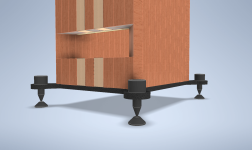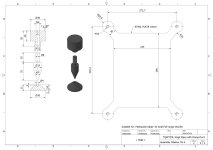for LS series boxes but what about FHXL and pensils?
With a FR, single driver loudspeaker, the anatomies that the filters are meant to address are not really affected by the box, it only affects the lower frequencies, and the speakers diffration signature.
dave
As for measurement
Measurements are a very useful tool, easily misinterpreted, often ignores context. Experience is very important.
In the end it is you listening to your music, in your room, has to satisfy you.
Different systems (amps + speakers + what connects them has to be considered a system), have different compromises, different strengths and different weaknesses. Add to that the listener is often not hearing the “whole thing”. Different strengths important to different people, make different speakers better.
It is amazing, both to experience yourself, and in seeing others as the sense of what your ear/brain is perceiving more as you get trained in listening. The general figure is 10,000 hours of training for any endeavour, listening, playing an instrument, being good at a sport, bbeing a doctor …
So from Tery Crabbe, one of my mentors, “Trust your ears”. A recent intro that mentions him: https://www.diyaudio.com/community/threads/new-old-kid-on-the-block.415189/
There is no best, only better for your needs. And don’t forget, that except for a vanishing low few, budget is a big part of those compromises.
dave
So have to buy first in the case of MA
MA have some of the tightest QC, so you can be pretty sure if you put a pair in a box they were designed for they will do well. BR are probably the busiest, quarter-wave designs tend to be more tolerent of parameter spread, (as well as often some tunmability ion th field).
The variations in production that Harley gets will be within the normal MA range (tight), he is pair matching to optimize stereo performance. Most important is sensitivity. He is buying enuff of them to create pretty well matched pairs.
The matching of MAOPs is not as tight as i did for my EnABLed drivers, not sure on Harley’s process.
dave
THD isn't actually much use,
Geddes has done research that suggests the kind of distortion measurements we take on loudspeakers does not become auarally evident until quite high. He put out a figure of 25%. After that he told people top ignore the chapter on distortion in his book.
Don’t get me wrong, distortion is important, we just haven’t figured out what to measure and how to interpret. Add to that many listeners prefer a system that has some second order distortion. Add to that Nelson’s work on the nature of how we perceive it. He even designed a device to let you play, H2 i believ it is called.
dave
There's a reason big systems with HE 15in woofers & compression horns exist.
But to get really good require some capability to delay time. So 3 or 4 way active and significant listening distance to help ameriolate the large driver spacings. BIG Bucks.
A WAW takes you in a similar direction, retaining much (in some cases more, since they are relieved of LF duty) of what the FR delivers while delivering greater potential levels and dynamics, and as deep and as much bass as you can afford. But the added bit will usually more than double the cost of the build. Fortuneatly you can get there in stages (add woofers to your original FR build).
dave
Broadly speaking agreed (as you know 😉 ), although the old Altec systems crossing ~500Hz - 800Hz was 'good enough' WRT driver spacing at the intended listening positions, and were some of the few systems that could get close to ~'live' SPLs and dynamic range on concert orchestral material. Whether most would want or be able to use that in their own homes is another matter of course. 😉
Mmm … I am getting a fuzzy feeling about all these playing by the ear approach. For all we know what @Hondasnl did is fine, put a known driver in some cabinet not engineered for it but hey the clone does sounds really great at 20% of the price.
KJF sells kits for Pensil and FXHL, MA churns out drivers cheaply at a rate of knots. Measuring equipment looks affordable so expecting to see some results to back up listening experience…
KJF sells kits for Pensil and FXHL, MA churns out drivers cheaply at a rate of knots. Measuring equipment looks affordable so expecting to see some results to back up listening experience…
Last edited:
acko,
Came across this - a US$ 13,900/- loudspeaker with a single wide-band driver; read the review and then look at the measurements 🙂:
https://www.stereophile.com/content/voxativ-ampeggio-2024-loudspeaker
Came across this - a US$ 13,900/- loudspeaker with a single wide-band driver; read the review and then look at the measurements 🙂:
https://www.stereophile.com/content/voxativ-ampeggio-2024-loudspeaker
As I see it, the best shoot out for comparison (in the price range) is Sibelius vs Eikona Marlow EV…
acko,
Don't fret over the measurements; let your Sibelius come and give it decent listen, and then tell us about your impressions. 🙂
In the meantime, it would be nice to know a little bit more about the room, playback chain and the genres of music you usually listen to.
Don't fret over the measurements; let your Sibelius come and give it decent listen, and then tell us about your impressions. 🙂
In the meantime, it would be nice to know a little bit more about the room, playback chain and the genres of music you usually listen to.
Yes, that’s the way 🙂
My current audio chain for testing is :
DAC: Ackolabs -> Roon/HQPlayer -> Amp :Benchmark AHB2 -> Speakers: Jordan JX92 VTL (DIY’ed)
Use case, for testing DACs mainly so need the rest to be neutral sounding and revealing. Jordans ok for vocals, classical and jazz but not beyond that… car audio sounded better for pop/rock etc. I go for all genres of music especially for testing DACs
As for speakers the choice was between Eikona Marlow and Sibelius. Both looked quite suitable but decided on the latter because of bass extension. I like Harley’s decision of not going for an LS type bookshelf. Had Rogers LS5a before, great speakers but found bass on the thin side a bit and needed helper subs.
My current audio chain for testing is :
DAC: Ackolabs -> Roon/HQPlayer -> Amp :Benchmark AHB2 -> Speakers: Jordan JX92 VTL (DIY’ed)
Use case, for testing DACs mainly so need the rest to be neutral sounding and revealing. Jordans ok for vocals, classical and jazz but not beyond that… car audio sounded better for pop/rock etc. I go for all genres of music especially for testing DACs
As for speakers the choice was between Eikona Marlow and Sibelius. Both looked quite suitable but decided on the latter because of bass extension. I like Harley’s decision of not going for an LS type bookshelf. Had Rogers LS5a before, great speakers but found bass on the thin side a bit and needed helper subs.
… and FWIW, @Hondasnl Sibelius clone should be compared with Pensil or FHXL type speakers, nice kits from KJF Audio and Planet10 for diy🙂As I see it, the best shoot out for comparison (in the price range) is Sibelius vs Eikona Marlow EV…
The Sibelius I heard were on Townshend podium stands and I think this helped that bass/room interaction.Last week I installed the terminals.
Nice small terminals for doing the job.
Material for the stands I also have.
For the hi-fi racks I make, I have found a very good (and fairly low cost) solution for isolation/coupling using stainless steel ball end grub screws and zirconium balls. It could be good and easy to try out (removable if needed) in your stand if you wanted the details.
In the Pensils we trialed (I still preferred our A7.3 to the actual Sibelius) I used some well-nuts to isolate the cabinet from its plinth that was permanently attached, I never did an A/B but the customer did and much preferred it with the added isolation.
"zman01
Came across this - a US$ 13,900/- loudspeaker with a single wide-band driver; read the review and then look at the measurements 🙂:
https://www.stereophile.com/content/voxativ-ampeggio-2024-loudspeaker"
Expensive drivers and expensive horns. Specially developed drivers that should be a further developed Lowther.
Can't imagine they sell in significant volumes. As long as there are fans and plenty of money, however, there will be buyers.
We older people who grew up with horns and clunky amplifiers still yearn for this type of speaker.
Mark Audio is a really good replacement for those big monster boxes.
Some may even like them more.
Came across this - a US$ 13,900/- loudspeaker with a single wide-band driver; read the review and then look at the measurements 🙂:
https://www.stereophile.com/content/voxativ-ampeggio-2024-loudspeaker"
Expensive drivers and expensive horns. Specially developed drivers that should be a further developed Lowther.
Can't imagine they sell in significant volumes. As long as there are fans and plenty of money, however, there will be buyers.
We older people who grew up with horns and clunky amplifiers still yearn for this type of speaker.
Mark Audio is a really good replacement for those big monster boxes.
Some may even like them more.
the stands will be as much as possible a copy of the originals (clone).The Sibelius I heard were on Townshend podium stands and I think this helped that bass/room interaction.
For the hi-fi racks I make, I have found a very good (and fairly low cost) solution for isolation/coupling using stainless steel ball end grub screws and zirconium balls. It could be good and easy to try out (removable if needed) in your stand if you wanted the details.
In the Pensils we trialed (I still preferred our A7.3 to the actual Sibelius) I used some well-nuts to isolate the cabinet from its plinth that was permanently attached, I never did an A/B but the customer did and much preferred it with the added isolation.
Only the base plate I use has a thickness of 10mm.
Attachments
Hondasnl, try to get some measurments, that would answer a lot of questions here about your project
I compare them to all the speakers I have built over the past 20 years and listen to them in the same room/house.
If anyone would like to take the measurements, you are very welcome.
Perhaps there are also Dutch people following this thread who have the knowledge and tools to perform correct measurements, you are welcome.
For me personally it is not necessary to take measurements.
If anyone would like to take the measurements, you are very welcome.
Perhaps there are also Dutch people following this thread who have the knowledge and tools to perform correct measurements, you are welcome.
For me personally it is not necessary to take measurements.
- Home
- Loudspeakers
- Full Range
- Pearl Acoustic Sibelius


